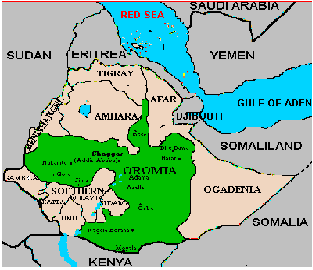Dear Folks!
May the Almighty Waaqayyoo Bless you all and help you in your struggle to get back the freedom man has taken away from you. Fight on in every direction.
The fight is not only by gun. Your pens can fight injustice. Your religion can fight it.
Your words can do so. Your money can make the service to justice. Even your silence does a lot as it did to kick out the colonial rulers out of India, smashed down the mighty power of America during the civil rights movement (remember the power of silence under Martin Luther king, Ms. Rosa Parks, etc.). I mean for those who reserve from using force to do away with injustice, they have other options to rather than sitting idle and see brothers and sister, mothers and fathers killed.
Dear folks, the world has taught us a great deal of experiences. One thing it did most is that "There is no free lucnch. And justice and freedom do not come freely even in democracy."Knowledge, rational strategy and tactic, wealth, life, etc. have to be spent.
However, there are different ways of going to achieve freedom and justice denied to an individual, groups, communities, and a a nation like the Oromos. However, going different ways to get to the same end does not create enemity between those who strive to achieve something for the common good of the people. But that different ways the liberators go to achieve liberation and justice should not be in a way that makes you subject to the enemy and threaten the safety and well being of your people. I would mention the experience of the African Americans' struggle, the case of Booker T. Washington Vs. W. E. B. DUBois, Marcus Garvey, and others. Their different strategies of struggling against the racial discrimination and their civil liberties tried to divide them and their people. But that finally pulled the people and the leaders together and towards realizing one common enemy, one common goal, and for one common people. Why not the Oromos?
The Oromians, after realizing the gradges between individual and political organizations, have realized that there is no other way to liberation and achieving of justice than by rallying under one banner, one goal, organization (with different forms), and support from each citizen. That is why today the sacrifice of the radicals, those who were born in the oppressive system, lived and saw the oppressive system are giving their lives to bring about a just system not only for their people but for the enemy too.
Therefore, my point is this. There is no either or in today's Oromo struggle. One question, one answer and one people to go for it. We have learnt through out the decades that our enemies do nothing for us whether we liberalize our stand, compromise our people's demands, or so. But in order to strengthen our unity and struggle let me quote the following from my readings. P. Alinsky say, tactics mean doing what you can with what you have.
Saul Alinsky has the following 13 models he calls RULES FOR RADICAL:- The rules for power tactics, Used by those leading liberation struggle in their communities:
1. Power is not only what you have but what the enemy thinks you have.
2. Never go outside the experience of your people.
3. But whenever possible go outside the experience of your enemy.
4. Make the enemy live upto their own book of rules.
5. Ridicule is mans most potent weapon.
6. Good tactic to fight the enemy is the one that your people enjoy.
7. A tactic that drags on too long becomes a drag.
8. Keep the pressure on with different tactics and actions.
9. The threat is usually more terrifying than the thing itself.
10. The major premise for tactics is the development of operations that will maintain
a constant pressure upon the opposition.
11. If you push hard a negative hard and deep enough it will break through into its
counterside.
12. The price of a successful attack is a constructive alternative.
13. Pick the target, freeze it, personalize it, and polarize it.
Add this Black Value System called Nguzo Saba, created by Maulana Karenga on September 7, 1965 in USA: Is it worth sharing with Oromos who value their struggle, their heros and heroess and their people?
The Seven principles of the Afro-centric guzo Saba (Black values) are:
1. Umoja (Unity): To strive for and maintain unity in the family, community, nation
and race.
2. Kujichagulia (Self-determination): To defoiner ourselves, name ourselves,
create our selves and speak for ourselves instead of being defined, named,
created.
3. Ujima (Collective work and Responsibility): To build and maintain our
community together and make our sister's and brother's problems our problems
and to solve them together.
4. Ujama (Cooperative econmomics): To build and maintain our own stores,
shops, and other businesses and profit from them together.
5. Nia (Purpose): To make our collective vocation the building and developing of
our community in order to restore our people to their traditional greatness.
6. Kuumba (creativity): To do always as much as we can, in the way we can, in
order to leave our community more beautiful and beneficial than we inherited it.
7. Imani (Faith): To believe with all our heart in our people, our parents, our
teachers, our leaders, and the righteousness and victory of our struggle.
These principles and Afrocentric values may help individuals adjust to the overall system.
Are they worth sharing? If yes send out .
Sincerely,
Abdi.

No comments:
Post a Comment
I am responsible for my posting.